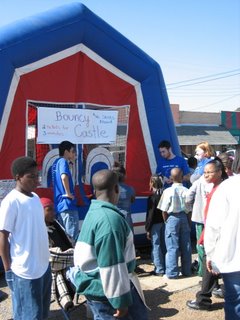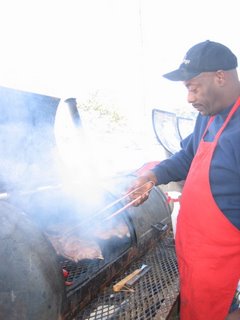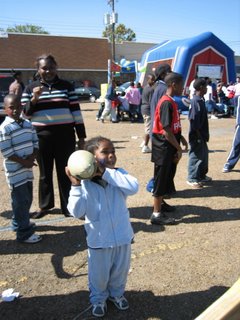Kinder Update
Supposedly, he will be pulled out (along with his brother, who is in another first grade class) for approximately 3 hours per day. This is of course, pending the adjustment of the special ed teachers' schedules. So who knows when it will happen and how long it will last. Or even if it will happen.
Last year, I had 6 special ed students, 3 of whom had pretty severe obstacles to learning. Unspecifically diagnosed, of course. I got a special ed teacher who took them out an hour in the morning and an hour in the afternoon about 70% of the time during the first nine weeks. Then inclusion really kicked in with upped supervision from the state department, and I got a special ed teacher in my room for an hour in the afternoon 3 times per week. I used him for centers. Then the state really came in, and changed the focus to only 2nd and 3rd grade, tested subjects, and I never saw my special ed teacher again.
Side note -- inclusion is fine if the staff is properly trained on how it should work and everyone tries to make it worka dnthe student is not too far behind. None of those things are true at my school. Pull the kids out, make your own lesson plans, and work at their actual level.
If K- is ever going to make progress, he needs to be taught one-on-one or in a very small group, at his level. Actual teaching. Like kindergarten. I hope that will happen in special ed. But I know for a fact that the teacher I worked with didn't make lesson plans, he just worked on "whatever he thought they needed." Which was good to some extent, because I'm sure he can tell, but also not good because when you don't plan your lessons they are poorly taught.
And he will still be in my room for 3 hours a day. Which means him arriving and departing at inconvenient times (because the sped teachers aren't strict about what times they arrive) and so even if I disciplined myself about my schedule, even a 2-minute discrepancy is too long. In 2 minutes you miss the most important parts of a first grade lesson or you don't have time to finish your work.
 Rev. Pitts and Mr. Frailich help set up the banner with the schedule of events.
Rev. Pitts and Mr. Frailich help set up the banner with the schedule of events. Some booths, such as this bouncy castle, were run by TFA volunteers.
Some booths, such as this bouncy castle, were run by TFA volunteers. Others, like this bracelet making stand, were run by community volunteers.
Others, like this bracelet making stand, were run by community volunteers. And a few were run almost entirely by students.
And a few were run almost entirely by students. The volunteer fire department lived up to its name by volunteering to fire up their grills and cook the food.
The volunteer fire department lived up to its name by volunteering to fire up their grills and cook the food. And Shelby Women United united to serve that food.
And Shelby Women United united to serve that food. The kids had a great time bouncing in the bouncy castle.
The kids had a great time bouncing in the bouncy castle. We went through 10 dozen donuts at the donut-on-a-string stand.
We went through 10 dozen donuts at the donut-on-a-string stand. Even the littlest Shelbyites loved to play the football toss game.
Even the littlest Shelbyites loved to play the football toss game. And everyone enjoyed the races that Save the Children ran, which included a crazy clothes race, a three-legged race, an egg-and-spoon race (shown here) and more.
And everyone enjoyed the races that Save the Children ran, which included a crazy clothes race, a three-legged race, an egg-and-spoon race (shown here) and more. Even Mayor Grimm showed up for a brief speech.
Even Mayor Grimm showed up for a brief speech.



